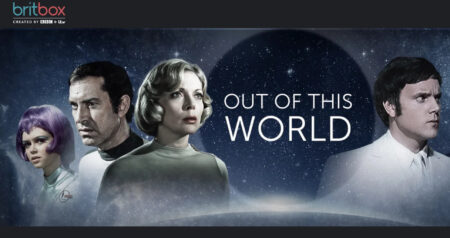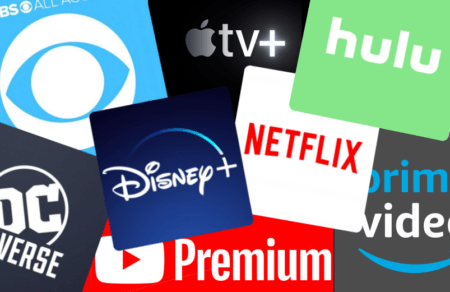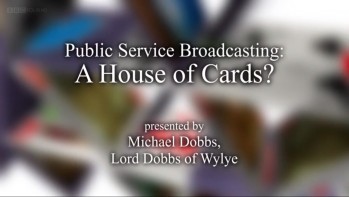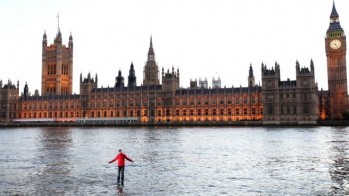When BritBox was announced, many wondered what impact it would make. Unless it offered something beyond the freely accessible programmes on BBC iPlayer and ITV Hub, what incentive would people have to start subscribing to another streaming platform?
As someone with an interest in archive television, streaming services have offered little to appeal to my tastes. When BritBox launched in the UK, I felt underwhelmed, though no more than I expected to be. Netflix’s provision for the 20th century is woeful: just 7% of the films and television programmes on its US service were released before 2000, while Amazon’s Prime Video is little better with 22% [1]. My browsing tells me that Netflix UK is much the same. Although we’ve a greater number of new shows and streaming supposedly provides better access than ever to as much television as we could want, the platforms providing them have been content to ignore most of the medium’s history.
The success of both the Talking Pictures TV and ForcesTV channels over the last few years has proved that there is an audience for less well-known archive programmes. Happily, within a few months of its launch, BritBox started to acquire some different archive items. Many are billed under BritBox’s ‘Out of This World’ collection, which currently includes Blake’s 7,Captain Scarlet and the Mysterons,The Hitch-Hiker’s Guide to the Galaxy, UFO, Randall and Hopkirk (Deceased), Sapphire and Steel, Space: 1999, Survivors, Thunderbirds and Timeslip.
While some of these programmes have received recent repeats, others have had to be sought on DVD and therefore offered a relatively steady market for a medium that has otherwise been fading in popularity – DVD player ownership peaked in 2009 [2] and Blu-ray has never took off in large enough numbers to replace it. Physical media has remained a necessity for viewing a broad range of archive television so now that looks set to change, does something like BritBox pose a threat? Will people decide to opt for the ease and space-saving of streaming now they can? They may not have a choice.
Companies like Disney and Warner Bros have experimented with limiting physical releases to short periods on a cycle in order to keep their values high. It’s been over a decade since DVDs were flying off the shelves with large profit margins. Limited edition DVDs or Blu-rays are among the few types of releases that can still command higher prices. Exclusivity is more important than ever for content to retain its value. Yet as the streaming market expands and more viewers move away from physical media, it’s reasonable to see some physical releases grounding to a halt entirely, which could eventually leave streaming as the only option to access the copyright holders’ archives.
Disney has cemented their control over access recently. After 25 years of broadcasting, Disney Channel, along with its sister channels Disney XD and Disney Junior, all closed down in the UK at the start of October 2020. The company’s Disney+ streaming service launched in the UK last year. Now, Sky and Virgin Media customers who previously received the broadcast channels will have to pay an extra £5.99 a month to access Disney’s content via Disney+. In addition to this, Disney’s content is now gone from Netflix, further driving audiences to Disney+. Similarly, following the launch of BritBox, the BBC and ITV will not be renewing programme contracts with Netflix and don’t plan to licence programmes to Netflix or Amazon in the future [3]. This all offers the potential for ultimate exclusivity.
Exclusivity offers publishers considerable control over what viewers are permitted to watch. Programmes may be edited or removed entirely and it’s impossible to predict the myriad reasons why all sorts of films and television programmes could disappear from streaming platforms in the future. One example already seen was that when Little Britain and Come Fly With Me were withdrawn from BBC iPlayer and BritBox earlier this year DVD sales on Amazon shot up [4].
iTunes users have already realised that digital purchases are not a worthwhile replacement – I’m personally bitter every December after losing songs from a NOW Xmas album. Amazon also recently reminded users that they do not actually own films or TV shows they purchase through Prime Video, but access them under a ‘limited license’, essentially meaning that they can still disappear if the copyright holders withdraw them [5].
Disney’s history and back catalogue undoubtedly offer it a degree of prestige that can’t be ascribed to all content. However, audiences are not tied into lengthy contracts with subscription streaming services and gain nothing from loyalty. Viewers have been attracted to specific platforms by high-profile offerings and once these are exhausted they may feel unenthusiastic about the rest. As the number of platforms continues to grow, Netflix’s domination of the market is no longer guaranteed as it’s conceivable to see households dipping in and out of different services every few months.
If audiences start moving between platforms regularly, one way to keep them on board would be to cycle series around. e.g. In January series 1 of a show is available, in February series 2 goes up, in March series 3 appears. Perhaps they all stay available through April before series 2 and 3 disappear again in May. New viewers who have only just started series 1 will have to keep subscribing for another three months. This might seem unfair to audiences that have grown used to binging entire box sets over a few weeks, but if a platform has exclusive programming rights viewers would have nowhere else to defect.
Those in favour of streaming have often pointed to its greater convenience – you can access anything, anywhere, anytime. But this may not be true in the future. With streaming the audience never owns anything – they are permanently renting from an owner who can swap things around whenever they like. Most subscribers seem ok with this, but will that change when the programmes people want to see start to disappear more often – either briefly or permanently? I’ll stick to DVDs for as long as I can.
Hannah Cooper has spent the last few years travelling back in time to visit numerous TV programmes and she occasionally returns to the present day to write about them. When there aren’t pandemics on, she can frequently be found in nice pubs and/or chatting to lovely people about interesting television. Her DVD and Blu-ray collection is in alphabetical order and split by genre.
Footnotes
[1] https://businessinsider.com/movies-tv-shows-from-each-decade-netflix-hulu-hbo-disney-2020-7?r=US&IR=T
[2] https://statista.com/statistics/289180/household-penetration-of-dvd-players-in-the-uk/
[3] https://independent.co.uk/arts-entertainment/tv/news/britbox-netflix-itv-bbc-british-shows-removed-a9193756.html
[4] https://pinknews.co.uk/2020/06/10/little-britain-dvd-sales-amazon-bbc-iplayer-netflix-blackface/
[5] https://techradar.com/uk/news/amazon-prime-video-reminds-us-we-dont-own-the-tv-shows-and-movies-we-buy








Thank you so much for this piece Hannah – it affirms a lot of my fears about streaming not being able to give me the reliable access to television which I really need for my work and hobbies… as well as backing it all up with some fascinating data *and* telling me all sorts of other stuff I didn’t know. So relieved that my wife and I still have a DVD burner to build up our own “on site” archive of stuff we think we may need or want to return to.
So delighted that your thoughts are appearing here. I’m sure everyone will also enjoye more pieces like this.
All the best
Andrew